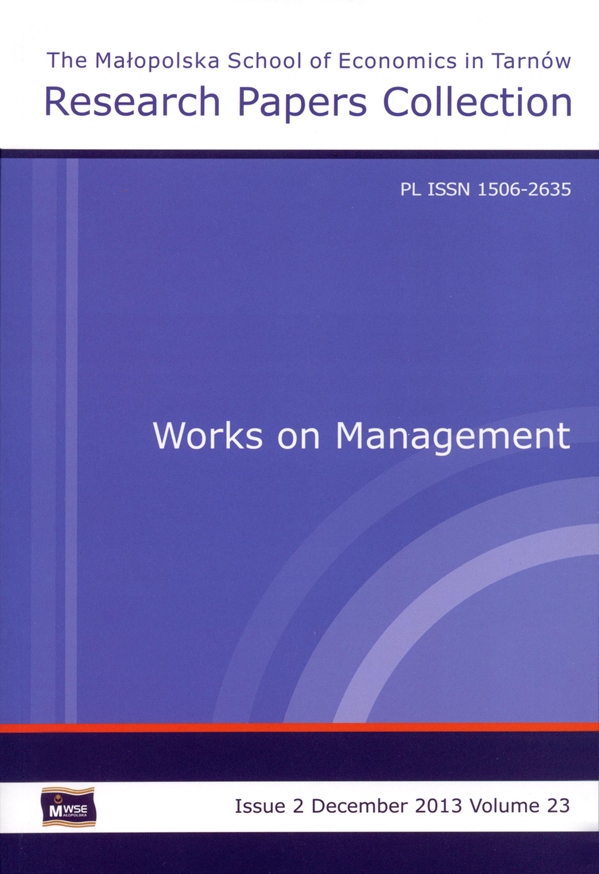Abstract
The research described in the paper is aimed at presentation of the concept of the innovation process and formulation of a model of innovative potential in tourist companies, along with defining determinants of this potential. With this concept, innovativeness was assessed in the examined tourist companies from the SMB sector. The content included in the introduction allowed preliminary identification of the issues of how competitiveness and globalization stimulate innovativeness in tourism, what are the basic sources of innovativeness in tourist companies, how significant is the human factor, entrepreneurship and knowledge in the innovation process. The following part of the paper presents the discussion on the basic terms related to the innovation process and the innovative capacity of an organization, along with classifications of innovation used in tourism. The determinants of innovative potential are described, such as employee competencies, modernity of infrastructure, the level of cooperation in managing knowledge, method of work organization and protection of knowledge (innovation) originated inside the organization. The empirical part of the paper includes the results of the research on assessment of degree of innovativeness in tourist industry companies in the Małopolska region. It has been found out that it is mostly knowledge and skills of employees of tourist companies as well as cooperation between the entities in the given industry that determine the degrees of company innovativeness. The basic source of innovations in tourist companies thus comes from knowledge of employees and knowledge acquired from the outside, from other organizations.
References
Aghion Ph., Hemous D., Kharroubi E. Credit constraints, cyclical fiscal policy and industry growth [online, accessed: 2013-03-28]. National Bureau of Economic Research 2009. Available online: http://www.nber.org/papers/w15119.pdf?new_window=1 (Working Paper, no. 15119).
View in Google Scholar
Bendyk E. “Jak leniuchować, żeby pracować”. Polityka, 2013, no. 33 (2920).
View in Google Scholar
Camison C., Monfort-Mir V.M. “Measuring innovation in tourism from the Schumpeterian and the dynamic-capabilities perspectives”. Management in Tourism, 2012, iss. 33.
View in Google Scholar
Cooke P. Knowledge economies: Clusters, learning and cooperative advantage. London: Routledge, 2002. ISBN 978-0-415-16409-2.
View in Google Scholar
Cooper C. “Knowledge management and tourism” [online, accessed: 2013-08-17]. Annals of Tourism Research, 2006, vol. 33, iss. 1. Available online: http://www.veilleinfotourisme.fr/servlet/com.univ.collaboratif.utils.LectureFichiergw?ID_FICHIER=1333691709786.
View in Google Scholar
Creative expression: An introduction to copyright and related rights for small and medium-sized enterprises [online, accessed: 2013-08-14]. WIPO Publication, no. 918 (E), 2006. Available online: http://www.wipo.int/export/sites/www/freepublications/en/sme/918/wipo_pub_918.pdf.
View in Google Scholar
Fischer T. Managing Value Capture. Heidelberg: Gabler Verlag, 2011. ISBN 978-3-8349-3251-8.
View in Google Scholar
Hall C.M., Williams A.M. Tourism and innovation. New York: Routledge, 2008. ISBN 978-0-415-41404-3.
View in Google Scholar
Hjalager A.M. “A Review of Innovation Research in Tourism”. Tourism Management, 2010, vol. 31.
View in Google Scholar
Hjalager A.M. “Repairing innovation defectiveness in tourism”. Tourism Management, 2002, no. 23.
View in Google Scholar
Hurmelinna-Laukkanen P.L., Sainio M., Jauhiainen T. “Appropriability regime for radical and incremental innovations”. R&D Management, 2008, vol. 38, iss. 3, pp. 278–289.
View in Google Scholar
Innowacje i Wiedza. Biuletyn Informacyjny. Ostrów Wielkopolski: Centre for Innovation and Innovation Knowledge in the Southern Wielkopolska region in Ostrów Wielkopolski, 2006, no. 3.
View in Google Scholar
Nordin S. Tourism clustering & innovation: Paths to economic growth & development [online, accessed: 2013-08-01]. Östersund: European Tourism Research Institute Mid-Sweden University, 2003. Available online: http://www.diva-portal.org/smash/get/diva2:352389/FULLTEXT01.pdf.
View in Google Scholar
Peters M., Pikkemaat B. “Towards measurement of innovation: A pilot study in the small and medium sized hotel industry”. In: Innovation in hospitality and tourism. Ed. A. Peters, B. Pikkemaat, New York: Routledge, 2006. ISSN 1528-008X.
View in Google Scholar
Podręcznik Oslo: Zasady gromadzenia i interpretacji danych dotyczących innowacji. OECD and Eurostat, Release 3. Warsaw: Ministry of Science and Higher Education, Departament of Strategy and Development of Science, 2008. ISBN 978-83-61100-13-3.
View in Google Scholar
Riley M., Ladkin A., Szivas E. Tourism employment: Analysis and planning. Clevedon: View Publications, 2002. ISBN 1-853150-31-8.
View in Google Scholar
Tether B. et al. Innovation in the Service Sector. Manchester: University of Manchester, Centre for Research on Innovation and Competition, Manchester 2002 (Working Paper, no. 11).
View in Google Scholar
© Copyright by Małopolska School of Economics in Tarnów. The articles are available under the Creative Commons Attribution NonCommercial-NoDerivatives 4.0 International License


